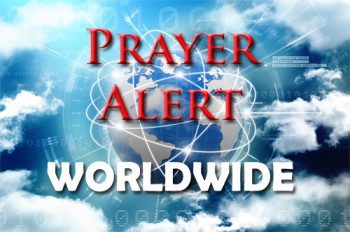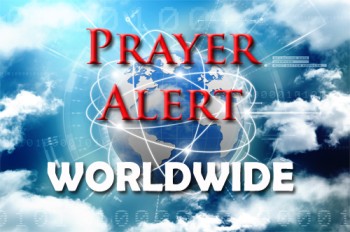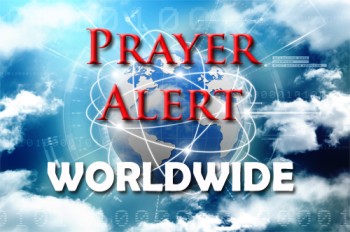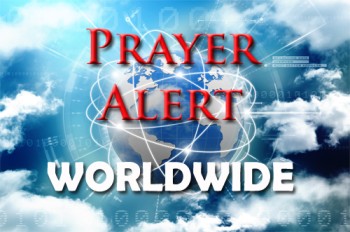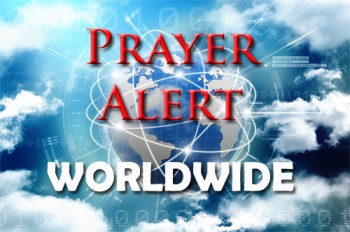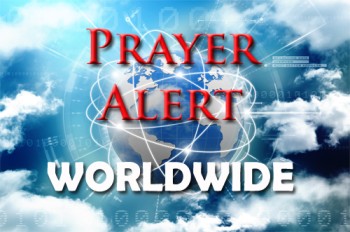Displaying items by tag: Asia
Liz Truss’s trip a ‘dangerous stunt’
London’s Chinese embassy called Liz Truss’s trip to Taiwan a ‘dangerous political stunt’ which will bring nothing but harm to the UK. In a pre-briefed extract of her speech to the Prospect Foundation, Truss was expected to say, ‘Last summer Rishi Sunak described China as the biggest long-term threat to Britain, and he promised to close all thirty of UK’s Confucius Institutes, which promote Chinese culture on campus in higher education and in some British schools. Sunak was right; we need to see those policies enacted urgently. Confucius Institutes must close, and the service supplied by Hong Kong and Taiwanese nationals in the UK on a free basis.’ The embassy urged Truss to stop supporting ‘Taiwan independence’. Taiwan has been separate from the People’s Republic of China since 1949, but Beijing insists on reuniting Taiwan with the mainland, by force if necessary.
Japan: G7 peace message and WPC call to prayer
Japan’s Kishida Fumio will host the G7 summit between 19 and 21 May. He condemns Russian aggression and feels that what is happening in Europe could easily happen in the Indo-Pacific. G7 sees climate change as a concern, but Japan reminds us we need to confront proliferation of nuclear weapons. Putin has threatened to use nuclear weapons should the Ukraine conflict not go his way. A global effort is needed to lessen the possibility of using them. This summit is in the Indo-Pacific region, ripe for future peacekeeping needs across the Taiwan Strait. China’s aggression towards Taiwan would threaten peace globally. On 20 May at 10 am BST (GMT+1) the World Prayer Centre in Birmingham is calling people to pray for the summit, the G7 leaders, Japan, and many of the above issues. For more information and to join us, click here:
India: bandaging the broken body
There has been an epidemic of violence toward Christians in Uttar Pradesh. In one attack, radical Hindu nationalists destroyed the church, burned everything especially the Bibles and injured the congregation. They demanded the Christians leave the area, warning the police would not protect them. Sure enough, the police stood back at first, then arrested them, but released them to go to another village and attack Christians. Traumatised and hungry, the Christians returned to repair the damaged village. ICC heard about the attacks and came to aid the small Christian community of 30 with food packages, rent for their stay, medical attention where needed and building materials to repair the church. ‘When we saw things that were brought to us like groceries and the items for the church repair, I felt scriptures being fulfilled in our lives. When one part of the body suffers, the other part shares and helps’, said one member of the congregation.
Israel: fighting continues
On 10 May militants fired 507 rockets and mortars at Israel, and Israel struck 158 Palestinian Islamic Jihad (PIJ) targets in Gaza. Twenty-five people have died and 76 injured in Gaza since 9 May, when Israel began its operation against PIJ with a series of strikes which killed three of its commanders. The PIJ is responsible for many recent rocket attacks on Israel. On 11 May Israel's military killed the commander of the PIJ and two other militants in a pre-dawn air strike on an apartment in Gaza. Later Israel’s sirens sounded as 10 mortars were fired from Gaza at Israeli communities in southern Eshkol. Some hit homes and buildings, but most landed in open areas or were intercepted. Prime minister Benjamin Netanyahu warned, ‘Israel's campaign is not over. We have hit PIJ with the most significant blow it has ever suffered’. PIJ threatened ‘dark days ahead' if Israel increased aggression.
India: churches burn in ethnic violence
Over a hundred churches have been burned down in Manipur. The number of dead and injured is difficult to verify. The BBC reported 60 dead, 200 injured, and tens of thousands displaced. 53% of Manipur’s population are Meitei (Hindus with some Christians). Two tribal groups are Naga and Kuki - Christians with ‘scheduled tribe’ status, which grants access to forests, government jobs, and education. Last week the Meitei demanded access to the status. Violence broke out between Kuki and Meitei. Thousands of troops have been deployed, and thousands moved to safety. The Riverside Christian Mission sent the following request: ‘Riverside has partnered with various ministries in Manipur for many peaceful years. Suddenly, terrible violence erupted between Meitei and Christian hill people. 80% of the people who have been killed are Christians. Everything which had a Christian identity or Christian mark was attacked by the majority community in Manipur. Many have fled. Please pray for God’s protection over these dear people, and that the soldiers stop the violence.’
Iran: executions rise amid unrest
Iran recently hanged two men for blasphemy, saying they had insulted the prophet Muhammad and promoted atheism. They were arrested in 2021 and spent months in solitary confinement without family contact. Iran has executed over 203 prisoners this year, but executions for blasphemy remain rare. The recent spate of executions, including members of ethnic minority groups, comes amid continuing protests over the arrest of Mahsa Amini by Iran’s morality police and her death in their custody. Over 500 people were killed and 19,000 arrested in the protests, which have been one of the biggest challenges to Iran’s theocracy since 1979’s Islamic Revolution. Today public frustration extends beyond repressive dress codes. The economy is in poor shape due to sanctions and Iran’s policy incompetence. Inflation is above 40%, currency is a record low, and unemployment tops 10%. Many believe that these anxieties mean further unrest is unavoidable.
Israel: ‘One Million March’
Tens of thousands of Israelis gathered in Jerusalem in a show of support for the controversial judicial overhaul plan by Benjamin Netanyahu’s government. Local media estimated that the event, which organisers had dubbed ‘The One Million March’, drew only about 80,000 people. It was sponsored by the Premier’s conservative Likud Party and its far-right coalition ally Otzma Yehudit faction. Among many who chanted ‘The people want judicial reform’ was justice minister Yariv Levin, who spearheaded the push for the overhaul. The nation has been gripped by unprecedented nationwide demonstrations against the deeply divisive plan since its unveiling 16 weeks ago. Mr Levin told demonstrators that ‘more and more people understand the need for the legislation. We are in an unusual situation. There is an atmosphere where people try to paint a picture of the elected government not representing the people. Today we are protesting to show that it does.’
Afghanistan: nothing can be done as babies die
Baby Tayabullah is motionless. His mother moves the oxygen pipe and puts a finger under his nose to check his breathing. She realises he is fading and cries. The hospital's ventilators are broken and small oxygen masks are not available, so mothers hold oxygen tubes near their babies' noses, trying to do what staff or medical equipment should be doing. About 167 Afghan children die daily from preventable diseases that could be cured with the right medication. If you go inside paediatric wards you will wonder if that estimate is too low. Rooms full of sick children, two or more in each bed, ravaged by pneumonia. Just two nurses looking after sixty children, in a room full of babies in a serious condition. A nurse said, ‘We don't have equipment or enough staff, which child should we check first? We can do nothing but watch babies die.’ When the Taliban seized power, foreign funding stopped and hospitals failed.
‘Bibles For the World’ helps church planters
Bibles For The World president John Pudaite was asked for a million Gospels of John to equip church-planters for their ministry in India. He offered first to bring 80,000 copies to a conference organised for church-planting leaders. 800 people serving on the frontlines of Gospel outreach came to the conference. When the Scriptures arrived, just in time for the last night of the conference, they were met with an enthusiastic response. ‘It was just amazing. 80,000 Gospels of John, about 100 per church planter, and they were snatched up literally in minutes’, said Pudaite. ‘They were so excited to be equipped in that way. We are working hard now to fulfil their requests for a million Gospels of John before the end of 2023.’
God’s word translated and shared
Sakachep Christians in India celebrated the dedication of the New Testament in their language, which took several years to complete. Now, for the first time, God's Word is available in their mother tongue. After the dedication, eager Sakachep people came forward for their own copy of God's Word. In the coming months several more Bible distributions in new languages are scheduled near the Tibetan border, and in the next few years over 20 new translation projects are planned. Also 771 million people in undeveloped countries catch diseases because they cannot get safe drinking water. The Bucket Ministry reduces that number by sharing God’s love and providing safe, clean water using a filter attached to a bucket that removes harmful bacteria in North America, South America, Central America, Asia, and Africa. Providing clean water also leads to opportunities to share the gospel. In ten years they’ve helped 250,000 families. The difference is lifesaving physically and spiritually.

